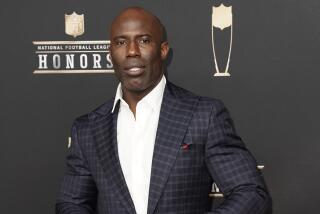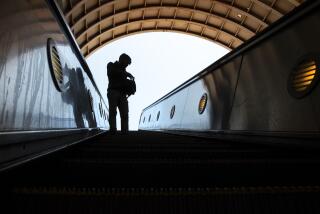Security Policy May Have Let Suspect Slip Past
- Share via
David A. Burke, the former airline employee suspected of carrying a gun onto Pacific Southwest Airlines Flight 1771 and firing shots that caused the plane to crash, may have been aided by a security system at Los Angeles International Airport that sometimes allows airline employees to bypass airport metal detectors simply by showing a familiar face, a number of people familiar with airport security said Tuesday.
The stated policy developed by the airlines and the security firms they hire says that airline employees--whose background has been scrutinized by the airline--may avoid metal detectors by showing their identification badges.
However, employees and security personnel familiar with that process acknowledged that it tends to become informal as those in charge of screening grow to recognize airline workers. In some cases, they said, badges are not required or are simply flashed without being scrutinized.
As a result, it would not have been difficult for Burke, whose ID badge reportedly was destroyed by USAir after it fired him on Nov. 18, to have walked around the metal detector, these people said.
Said one USAir employee, “It’s always possible to get through if they know your face.”
Metal Detector
It was not clear whether Burke had simply been permitted to walk around the metal detector at LAX’s Terminal 1, which houses PSA, USAir, Southwest Airlines and America West.
A co-worker said Burke might have avoided security by using one of several doors at the back of USAir’s offices, which are opened by combination locks. Several co-workers said they had seen Burke at USAir’s offices several times after his firing.
The incident underscores complaints cited last June by a General Accounting Office report that accused airlines, which under federal law are responsible for security at their respective terminals, of failing to oversee the private security companies they hire.
Weeks after that report was made public, a Department of Transportation task force on airport security criticized some airlines for “demonstrating that they have an interest in minimizing the costs of providing security.”
Unloaded Guns
The report compiled by the GAO, a congressional watchdog agency, cited routine Federal Aviation Administration tests conducted in late 1986, in which unloaded guns and defused grenades were carried through metal detectors. It said that about 20% of the weapons slipped past the security personnel who operate metal detectors.
Rates for specific airports were not released, but it was learned that the lowest was Phoenix’s Sky Harbor International Airport, where only 34% of the weapons were detected. Las Vegas’ McCarran International Airport was close with a detection rate of only 45%.
At LAX, the selection of a security contractor for each terminal is a compromise among the several airlines who share the terminal. At Terminal 1, security is performed by Allied Aviation Service, whose officials declined all comment Tuesday.
Security companies have long complained that to get airline contracts they must submit low bids that force them to hire minimum-wage employees, creating problems of competence and high turnover.
More to Read
Sign up for Essential California
The most important California stories and recommendations in your inbox every morning.
You may occasionally receive promotional content from the Los Angeles Times.










